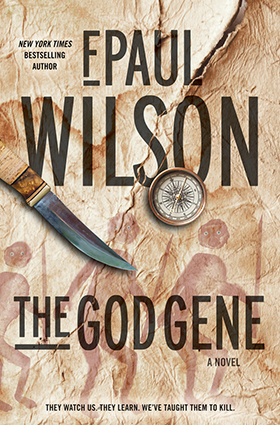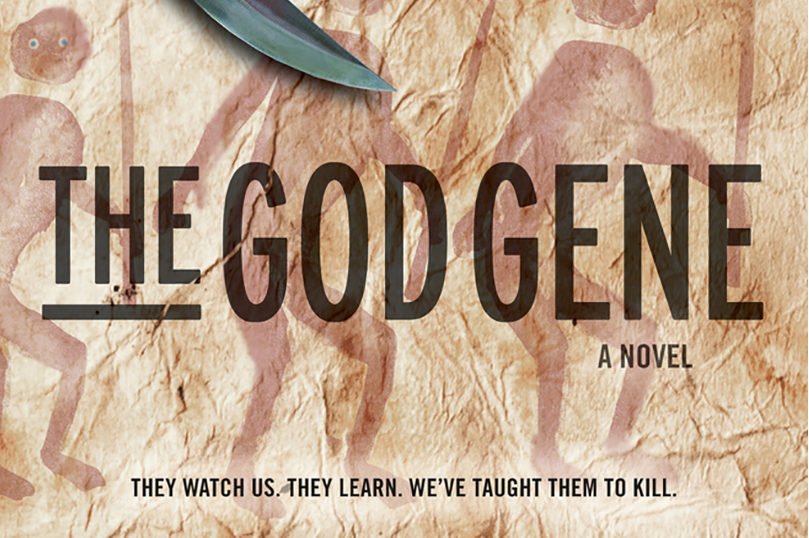 F. Paul Wilson interviewed by Heather Graham
F. Paul Wilson interviewed by Heather Graham
I’m thrilled to interview F. Paul Wilson. I have been in love with his work for years. In his new offering, Paul has given us an incredible work—and, if it shows the same brilliance as novels written by Michael Crichton, it’s because F. Paul Wilson is also a medical doctor, a man who has studied every new discovery in the field while compassionately treating patients. There’s a note of knowledge and veracity to his story, and those traveling through the scenes this master has created see vividly in the mind’s eye the world of Wilson’s characters. He kindly answered many questions for me, and so, I’m ‘thrilled’ to present this interview.
HEATHER GRAHAM: Despite the title, I’m going to assume The God Gene isn’t a religious book.
PAUL WILSON: Good assumption. It’s best described as a science thriller.
HG: I know it’s a sequel to Panacea, but is it a direct continuation, or something entirely new?
FPW: Both. Rick and Laura are back. After a rocky start in Panacea, the two of them are tentatively exploring a relationship. Laura is being sent a dose of the panacea every so often, so that’s still on the table, but everything takes a backseat when Rick’s older brother drops off the face of the Earth.
HG: So, as they say, “This time it’s personal.”
FPW: Correct. Rick is estranged from his family – hasn’t contacted them in years. When he joined the CIA, he was designated the official Black Sheep of the clan. But he and Laura learn that his brother Keith, an evolutionary zoologist, didn’t simply wander off one day. He first destroyed all the genetic sequencing he had done on a mysterious little primate he’d discovered in Mozambique, then liquidated all his assets and transferred them offshore. The mystery primate died suddenly and, on the day before Keith disappeared, he threw its ashes into the Long Island Sound. All coincidence? I don’t think so.
HG: Obviously he found something in that primate’s genome that he didn’t want to share. The “god gene” of the title?
FPW: Let’s define “god gene.” Two “god genes” exist in the real world: one type is from Dean Hamer’s book postulating a genetic basis for spiritual beliefs. The other, the one I adopted, refers to the genes that make us human, that sparked the brain developments that allowed us to leave all the other primates in the intellectual dust.
HG: So there are real “god genes?”
FPW: So-called. Real genes like miR-941, exclusive to the human genome, appeared seemingly out of nowhere a million or two years ago – popped out of our “junk DNA” and started coding. These pop-ups enhanced our neurotransmitters and brain development. Believers point to a human-exclusive gene like miR-941 as evidence of God affecting evolution. A God Gene.
HG: I’m going to assume – because of your title – that Rick’s brother found one of these god genes in that little primate.
FPW: That’s what everyone assumes. But it doesn’t explain his bizarre behavior. Though startling, the discovery would be a cause for further exploration rather than panicked flight. Keith had to have found something else – something unnerving enough to make him obliterate all evidence of his discovery and disappear. But what? That’s the mystery Rick and Laura must solve. Their search takes them to East Africa and Madagascar, and to a place no humans have ever been before. They wind up on the edge of human evolutionary science.
HG: A hard-science mystery-thriller.
FPW: As one of my early readers said, “Very Crichtonish.” It hadn’t been my intention when I set out, but The God Gene edged me into Crichton country.
HG: Not a bad place to be.
FPW: Not a bad place at all. I’ve always been something of a science geek, and I cut my writer’s teeth on SF.
HG: A long time ago.
FPW: Quite. Back when the Permian Extinction was still a fond memory. But the science in The God Gene is barely fiction. I make up my own “god gene” – one instrumental in sparking human creativity – but it could very well be real.
HG: The ads say The God Gene is part of “the ICE sequence.” What does that mean?
FPW: Damned if I know. Okay, seriously, when I told the publisher I was planning a third book with Rick and Laura, they wanted a name for the series. Rick has some strange ideas. He believes that the human level of sapience is so rare that when it occurs it attracts attention, and as a result we are all under the scrutiny of (to quote Wells) “intellects vast, cool and unsympathetic.” Rick calls them “ICE” – Intrusive Cosmic Entities – and believes they have long meddled with humanity from behind the scenes. ICE never manifest in the books, they’re simply posited as a possible explanation for some odd goings on.
HG: Sounds a bit Lovecraftian.
FPW: Because it is. The God Gene stands at the crossroads of Crichton and Lovecraft. You’d expect that to be an awkward place, but when you look carefully at Lovecraft’s fiction, much of it, deep down, is really SF. Again, not what I consciously set out to do, but now that it’s done and I look back, it works. Somehow it works just fine.
Order Your Copy
Follow F. Paul Wilson online on his website, Twitter, and Facebook.
Follow Heather Graham on Twitter and on Facebook.











